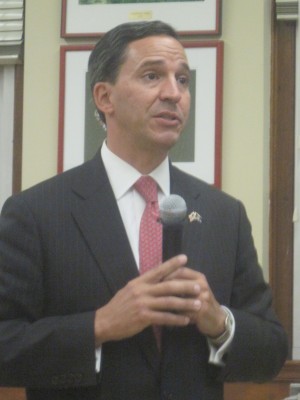State Sen. Jack Martins (R-Mineola) said last week he expects the state Legislature to follow a year of notable achievements in 2011 with reform of unfunded state mandates, increased aid to education, and possible pension and Medicaid reform in 2012.
In an interview with Blank Slate Media, Martins said he was confident that state education aid will rise 4 percent in next year’s state budget.
“That will happen this year, absolutely. That will be part of the budget. The key is to meet our commitment to funding education,” Martins said.
Faced with unfunded mandates, including increases in pensions and health insurance costs, local school districts are struggling to avoid cuts to staff and programs required under the 2 percent cap.
Martins said that addressing unfunded mandates, including increases in pensions and health insurance costs, are also priorities for the state Senate and Gov. Andrew Cuomo.
“Everyone acknowledges that we do need to look at the pension system.” Martins said. “We have to look at ways to make our pension contributions more predictable, looking at things longer term and certainly looking forward to discussions with the state comptroller’s office to encourage that we take a longer term approach to pension funding.”
Martins said discussions have focused on creating a tier VI of public employee classification which would carry higher employee contribution rates, later retirement ages and require a longer period for vesting.
Martins also sees potential savings in the state’s Medicaid program.
While he acknowledges the importance of Medicaid benefits for those who need them, he said there are elements of Medicaid such as travel vouchers that could be excised from the program.
“There are programs in Medicaid that the public is funding that frankly, they shouldn’t be. Not every program should continue. We should take a good hard look at how we spend our taxpayers’ money,” he said.
None of these issues present simple fixes, according to Martins, who notes that in the case of unfunded mandates “depending on who is affected, you get a different response.”
That’s all the more reason that Martins sees the need for the sort of bipartisan cooperation that accomplished the recent middle class tax reform.
“Everyone didn’t get everything they wanted. But everyone got something,” Martins said.
Martins said he and state Assemblywoman Michelle Schimel (D-Great Neck) are planning to propose legislation that would extend the period for municipalities to continue using mechanical lever voting machines rather than the new electronic ballot readers. A measure co-sponsored by Martins and Schimel last year enables municipalities to continue using the machines through the end of next year.
Lever machines cost $150 apiece to rent, while the scanners cost $1,500 per machine to rent.
In another bipartisan effort, Martins also co-sponsored a bill with Schimel amending the state law governing the consolidation of municipalities.
The bill stipulated a 60-day time period for collection of signatures to initiate a consolidation or dissolution. The bill also required creation of a study committee, with town representation to develop a dissolution plan, rather than leaving it in the hands of the existing village board as the existing law has it.
The bill passed the state Senate earlier this year, but not the Assembly. It’s still a priority for Schimel, according to her spokeswoman, Emily Frankel.
“We’re elected to get things done,” said Martins about his bipartisan work. “I was elected to go up to Albany, to work with my colleagues from across New York State, to build consensus and to protect the interests of my constituents. That’s what we do.”
As an example Martins pointed to the partial repeal of the MTA tax, which was highly unpopular on Long Island. The tax reduction was part of an omnibus bill that eliminated the tax for 289,000 small businesses with payrolls under $1.25 million.
“Anytime you can roll back a payroll tax for 80 percent of those who are paying it, it’s a positive in the region. It was clear that the tax was a focal point for everybody,” Martins said. “I was very pleased that one year in, we were able to roll it back as effectively as we did.”
The net result, he said, will be $200,000 more that businesses will have to invest in local economies.



